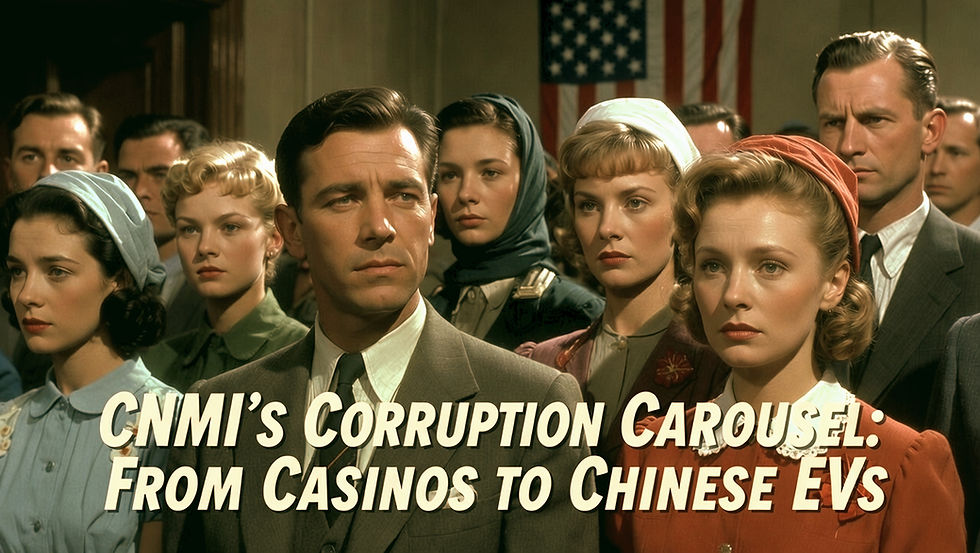“Broken Borders, Broken Promises: The Fight for U.S. Workers in America’s Pacific Frontier”
- CNMIGA .ORG

- May 22, 2025
- 6 min read
Updated: May 28, 2025
INTRODUCTION: THE SILENCED MAJORITY OF AMERICA'S FRONTLINES
Imagine an American citizen born and raised in the Commonwealth of the Northern Mariana Islands (CNMI), a U.S. territory, unable to find stable work in their own homeland. Picture a veteran returning to Saipan or Rota with dreams of contributing to their local economy, only to be displaced by an imported workforce paid below-market wages. Visualize entire communities, historically marginalized and Indigenous, watching as foreign labor dominates jobs, inflates housing markets, and stretches public resources to the breaking point.
This is not speculative. This is not political spin. This is the reality faced by American workers and Indigenous families across the CNMI, and increasingly, across the United States. We are witnessing the systemic dislocation of American workers in their own homeland, a crisis fueled in large part by the unchecked abuse of the CW-1 visa program and the phenomenon of birth tourism, chain migration, and foreign labor overreliance.
The American laborer is not asking for handouts. They are asking for fairness. For a level playing field. For protection from policies and politicians who prioritize foreign interests over those born under the American flag.
This exposé is a wake-up call and a roadmap. It details how the CW-1 visa, once a temporary transitional mechanism, became a pipeline for exploitation. It exposes how foreign workers, predominantly from the Philippines, have overstayed visas by the tens of thousands, created a subclass of anchor babies, and redirected critical public services away from American citizens.
We argue for a reorientation of national values: America first. Indigenous communities protected. Veterans hired. Local labor prioritized. Wages lifted. Dignity restored.
This article is not anti-immigrant. It is pro-American worker. It is pro-fairness. And it is long overdue.
SECTION I: THE HISTORICAL FOUNDATION OF THE CW-1 VISA SYSTEM
The CW-1 visa system originated as a compromise between federal immigration policy and local CNMI economic reliance on foreign labor. When the Consolidated Natural Resources Act of 2008 was enacted, it aimed to bring CNMI's immigration system into alignment with federal standards, ensuring better oversight, transparency, and protections for both workers and communities.

But what began as a temporary transition tool became entrenched and exploited. The Northern Mariana Islands U.S. Workforce Act of 2018 extended the program to 2029, increasing caps, reducing oversight, and triggering a flood of new CW-1 workers.
The vision of workforce development for Indigenous and American laborers was replaced by a model that subsidized foreign labor, undermined wage growth, and enabled widespread abuse. The program was marketed as a solution to a labor shortage, but in practice, it has become a perpetual labor import scheme that displaces local workers and promotes dependency on cheap, often undocumented, foreign labor.

SECTION II: THE RISE OF OVERSTAYS, VISA FRAUD, AND BIRTH TOURISM
What happens when temporary visas are treated as permanent invitations? For the CNMI, it means tens of thousands of visa overstays, systemic birth tourism, and the rise of "anchor baby" exploitation.
Filipinos have overstayed CW-1 and tourist visas in massive numbers. This is no longer anecdotal. It’s quantifiable. According to ICE and USCIS reports, overstay rates range from 5% to 10% annually. That’s over 1,000 undocumented individuals per year in the CNMI alone.

The consequences are grave. These overstays burden schools, hospitals, housing programs, and food assistance systems originally designed to uplift American citizens, especially Indigenous and relocated American workers. Moreover, they’ve facilitated birth tourism: foreign nationals arriving pregnant, giving birth in CNMI hospitals, and securing U.S. citizenship for their children, often with no intention of long-term contribution to the community.
This has led to a dramatic demographic shift. From 2018 to 2024, the CNMI’s foreign-born population has ballooned to nearly 49%, overwhelmingly from the Philippines. This is not cultural integration. It’s displacement.

SECTION III: WHO IS PAYING THE PRICE? INDIGENOUS AND AMERICAN WORKERS
For every CW-1 worker who secures employment, there’s an American or Indigenous worker sidelined. In 2022, over 11,300 CW-1 workers were hired, while fewer than 500 local U.S. citizens were brought into the workforce. That’s a local hiring rate below 5%.
The jobs lost are not isolated. They are widespread across sectors: construction, hospitality, retail, food services, and even healthcare. And with suppressed wages, local workers are forced to either leave the CNMI or rely on public assistance, fueling poverty and dependency.
This is particularly damaging to Indigenous Chamorro and Carolinian workers, who face cultural and economic erosion as their communities are marginalized in favor of an imported labor class. When local youth cannot find jobs, culture decays. Language dies. And families break apart.
SECTION IV: CORRUPTION, COMPLICITY, AND CW-1 FRAUD
The exploitation of the CW-1 system doesn’t occur in a vacuum. It is facilitated by corrupt business practices, governmental negligence, and political collusion.
Take A&A Enterprise CNMI, LLC — a shell company that fraudulently obtained CW-1 petitions, never offered real jobs, and extorted over $194 biweekly from workers for fictitious taxes. These abuses are rampant. Between 2018 and 2024, ICE investigated over 70 cases of CW-1 fraud, with dozens of convictions.
Yet enforcement is patchy. Oversight is weak. And politicians like former Del. Gregorio Kilili . Sablan, and now, the newly elected Del. Kim King-Hinds CNMI’s nonvoting delegate to the U.S. House of Representatives, have consistently pushed for visa cap expansions, softer compliance, and even pandemic unemployment benefits for CW-1 workers — while local Americans remained unemployed.
SECTION V: THE ECONOMIC CASE FOR REFORM
Ending the CW-1 loophole isn’t just morally right. It’s economically vital. Returning these jobs to American and Indigenous workers would:
Reduce CNMI unemployment by over 50%
Inject over $150 million annually into the local economy
Cut food stamp and housing voucher dependency
Stimulate small business development
Strengthen CNMI’s tax base and infrastructure
Instead of exporting wealth via remittances to the Philippines, we can circulate dollars within our islands, schools, hospitals, and businesses.

SECTION VI: POLICY RECOMMENDATIONS
End the CW-1 Program by 2029 Without Extension
Audit and Prosecute All CW-1 Fraud and Shell Companies
Implement Mandatory Exit Tracking for Visa Holders
Ban Birth Tourism and Enforce Pregnancy Screening Protocols
Prioritize American Worker Recruitment Through Subsidies and Incentives
Mandate Local Hiring Quotas for All CNMI Businesses
Establish an Indigenous Worker Protection Bureau
End Public Benefits for Visa Overstayers and Anchor Babies
Revoke CW-1 Employer Privileges for Labor Violations
Launch CNMI Workforce Training and Job Reentry Programs
CONCLUSION: A NEW ERA FOR THE CNMI — BUILT BY AMERICANS, FOR AMERICANS
The CNMI stands at a crossroads. We can either continue down the path of labor exploitation, cultural erosion, and American worker displacement — or we can rise.
Rise for the Indigenous mother trying to support her family.
Rise for the veteran turned away from a job he’s trained for.
Rise for the American dream that belongs to all citizens, regardless of race, origin, or location.
This isn’t just about visas. It’s about values. And it’s time we stand up and declare:
America First. Always.
About the Author
Zaji “Persona Non Grata” Zajradhara is a staunch advocate for American workers and indigenous rights in the CNMI. Labeled a “persona non grata” by the CNMI government for his relentless pursuit of justice and his outspoken criticism of corruption and foreign influence, Zajradhara has become a symbol of resistance against the forces seeking to undermine American sovereignty in the islands.
As An Unemployed Afro-Latino-Seminole American resident and father, Zajradhara's firsthand experience with the CNMI’s dysfunctional labor market, its rigged political system, and the exploitation of vulnerable communities has fueled his activism. He has filed numerous legal claims against companies, including Tan Holdings, for violating labor laws and discriminating against American workers.
His unwavering commitment to exposing the truth, challenging the status quo, and demanding accountability has made him a thorn in the side of the CNMI establishment and a target of their efforts to silence him. However, Zajradhara remains undeterred, determined to fight for the rights of American workers and to protect the CNMI from the grip of foreign influence.





Comments